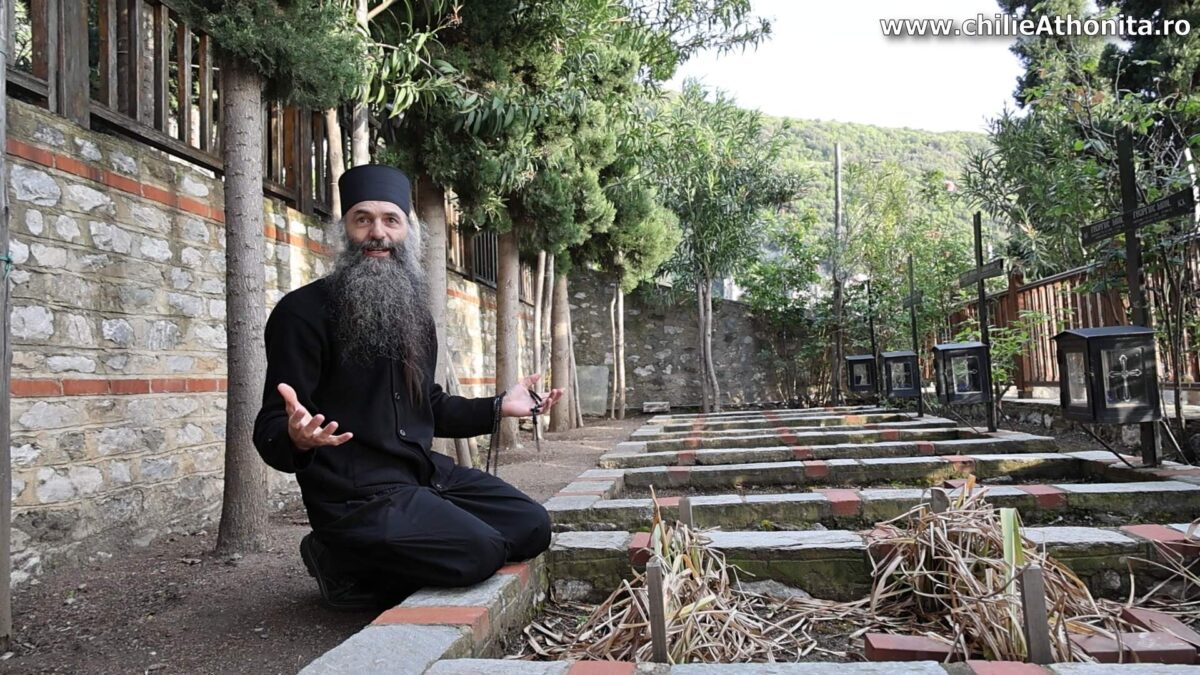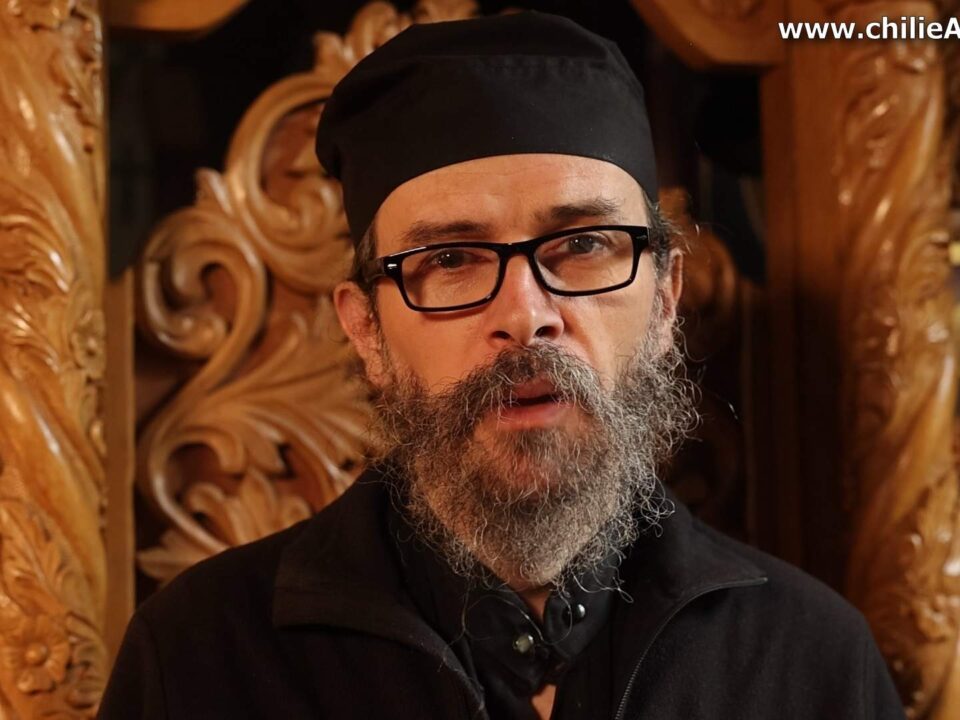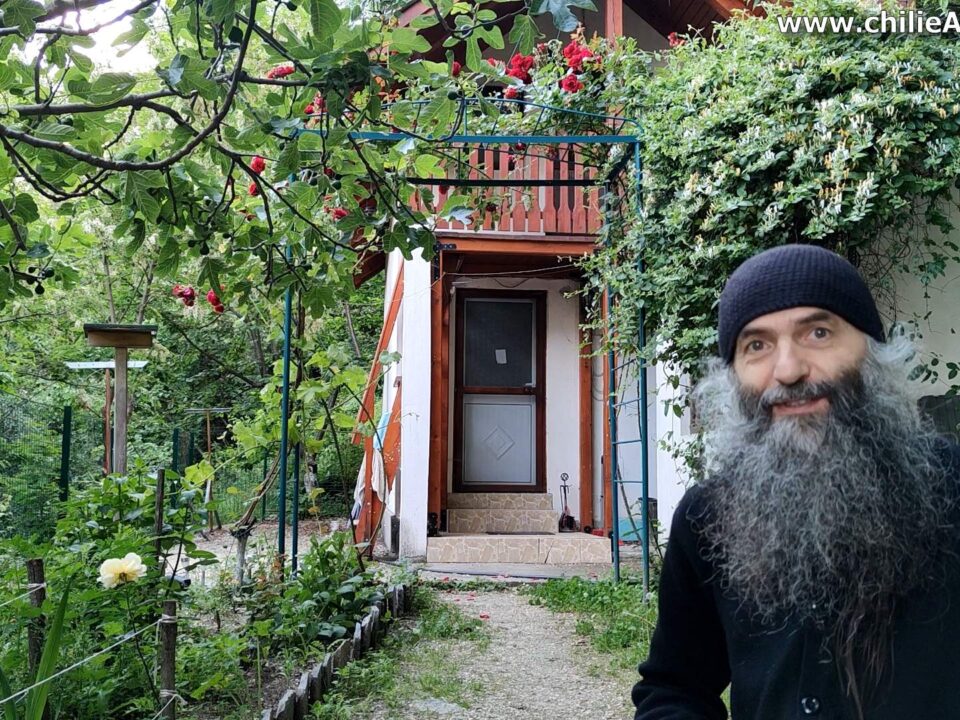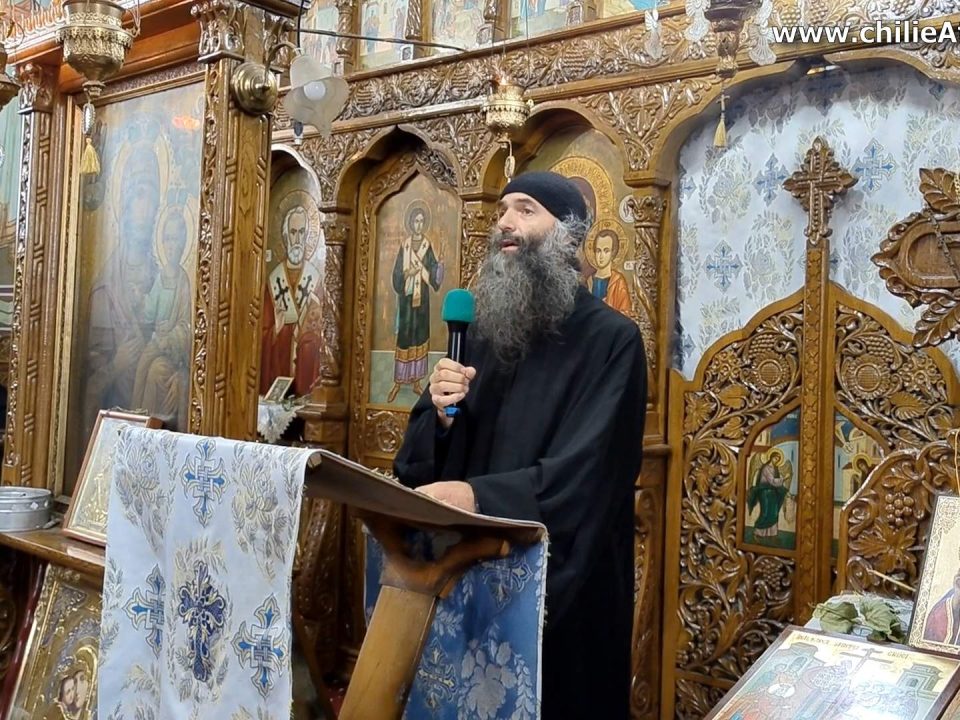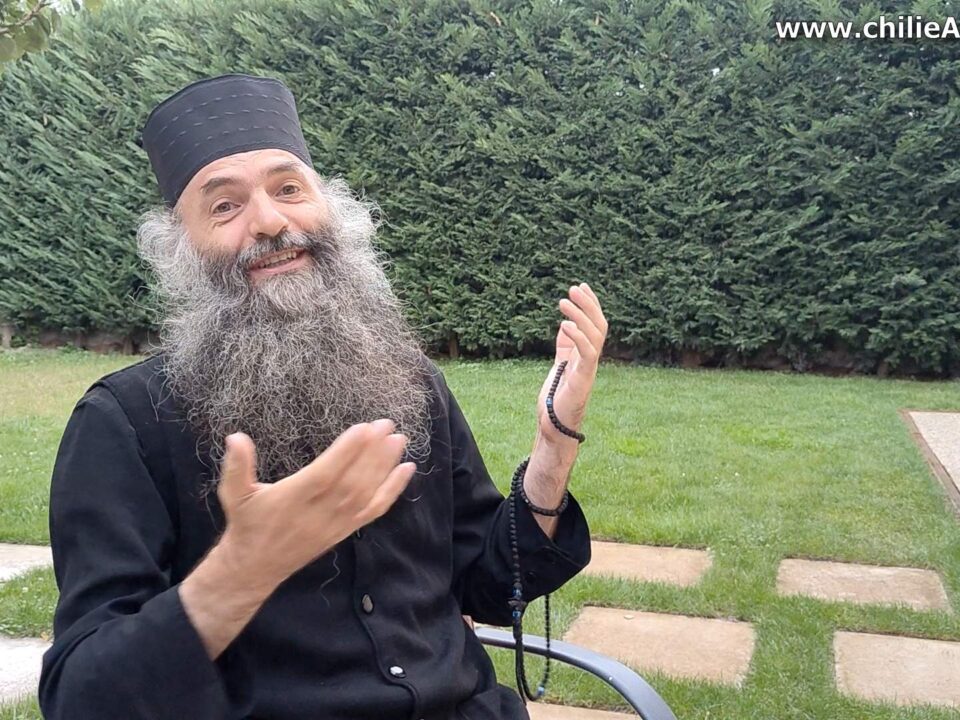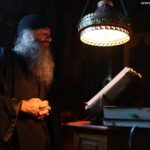
The Blessing of Illness – Fr. Pimen
4 May 2023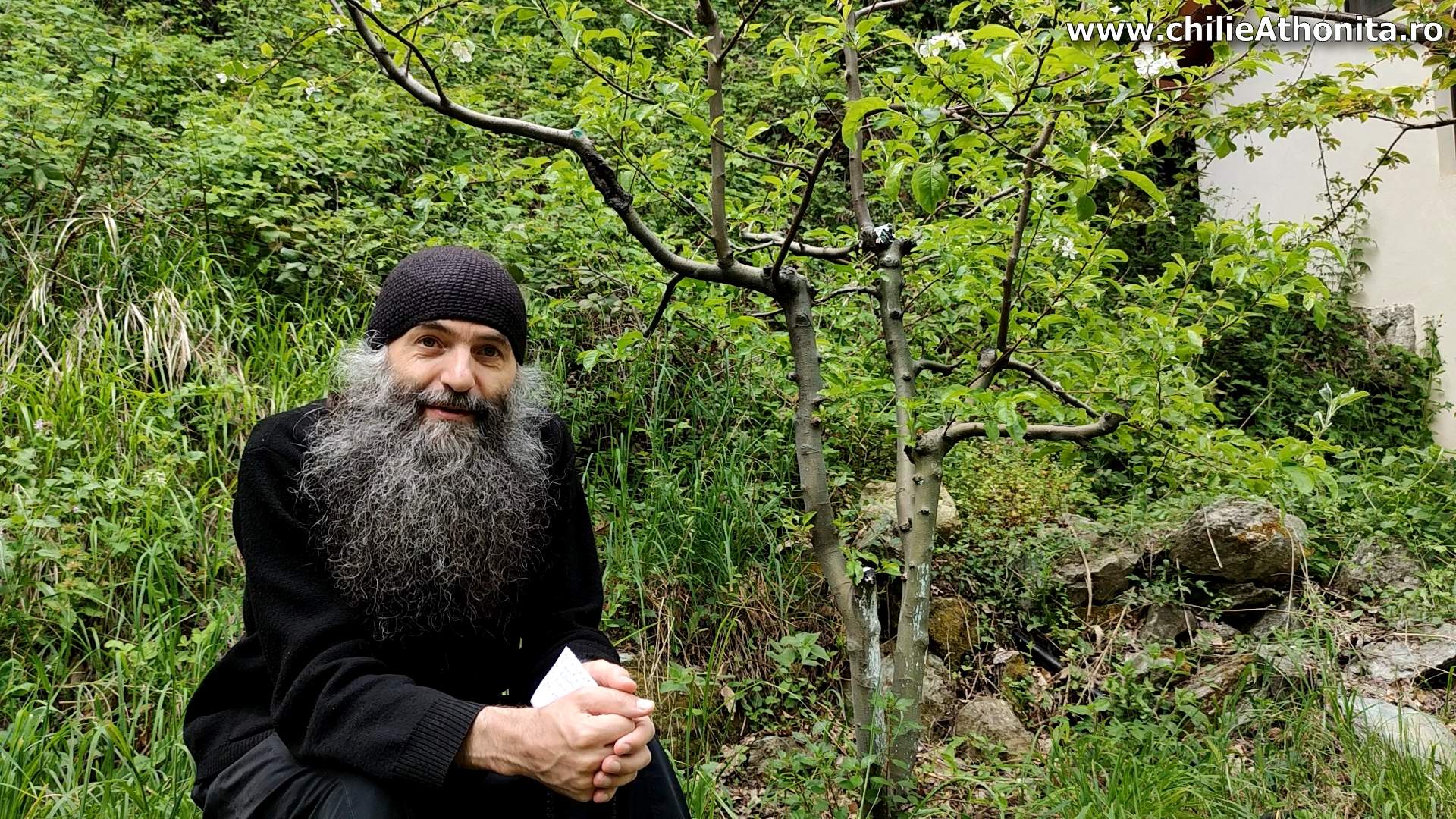
Saint Nektarios, Life, Miracles, Romanians – Fr. Pimen
18 May 2023Who are the spiritual fathers, the jewels with which the monastery of the Venerable Paul is adorned? On the occasion of the celebration of Saint George, we went to the tutelar monastery of our skete – the Monastery of Saint Paul.
There we also got to the monastery cemetery where Father Pimen Vlad spontaneously began to tell us about the spiritual fathers from this monastery. We started filming him and that’s how the present video came to be.
Enjoy!
Father Pimen: Fr. Metrophanes died at the age of ninety something. He was a struggler [ascetic]. He was 1.90 m tall, and in the church he only stood, he had a pew at the back, with a long praying rope in hand, [saying] “Lord, Jesus Christ, Lord, Jesus Christ!” And at one point,[he would say] “Get out of here!” The devil would come and bother him. Once I said to Elder Anthony, with whom I was: “Look, this is what I heard him say!” And Anthony answered me: “That’s nothing. I live in the cell right next to him; you should see at night what war is in his cell, you’d say it’s a fight, wrestling with the devil!”
Father Theologos: Glory to the Lord!
Father Pimen: There is also Monk Christopher, who passed not long ago. The others are from among the elders I caught. The elders of Israel, as they say, people with a holy life, people of struggle. There was also monk Anthony, whom I was obedient to for two years. He had a lot of discernment, he walked slow, in the rhythm of prayer. I did a year in the refectory with him. He never tasted [anything] between meals, and I’ve followed that ever since. We put all the goodies on the table, but we never tasted anything. When the meal was over, we would take our portion and eat that.
I tried to listen to him in everything. He was very calculated, quiet. In the second year, at the guest house, he asked for me at the synaxis, “Give him to me!” Many could not keep his rhythm because he was very calm and some were more agitated, “Let’s go faster father!” But he had his rhythm. In this way, I spent the second year with him, at the guest house, after which I took over the cell of St. Artemios. He said: “Don’t leave, stay, stay and help me!” because we got along very well. In his youth, he stayed at the Monastery of St. Sabbas for a year. And he was telling me how he met a Romanian elder who was there.
There were 3 Romanians in Athos. During the Second World War, when the Germans came, they left Athos for Jerusalem in a boat, thinking they will be killed by the Germans. They left in a wooden rowing boat for Jerusalem. One died on the way, one went insane, and only one made it to Jerusalem all right. You can imagine, for months… for a part of it they got pulled by a ship. The one who made it to Jerusalem alive is the one Elder Anthony met, and he was there when he died, at that time he was a sexton. One day, when he knocked on his door, he did not answer. There they had big doors with large key holes and when he looked through the keyhole, he saw that he had died on the chair. Bartholomew, I think he was named. My elder, Father Anthony, was an elder with discernment. My elder.
Let’s see… Jacob [is buried] there.
Monk: It’s in line with the tree in front of you, that’s why you don’t see him. I see him from here.
Father Pimen: No, I saw him, and Evsevios the monk.
Monk: He died last year.
Father Pimen: This young one.
Monk: The one who was a baker, not the one you know, another one, the second, and now there’s a third, Evsevios.
Father Pimen: A thin one from Athens.
Monk: He stayed at the house for a while, he was tall and with a white beard…, he was a new brother.
Father Pimen: There was a younger one…
Monk: That one left, he never came back, it’s not the same one…
Father Pimen: And there was another Evsevios, he was also abbot once, for a while, I don’t remember.
Monk: This one had come now in his old age to the monastery.
Father Pimen: All those who died from there are more recent… Jacob, he was from Ouranoupoli, yes…
Father Theologos: And the last one is Andrew? Abbot Andrew?
Father Pimen: Where?
Father Theologos: Right at the end.
Father Pimen: Nectarios the monk, also from here, an elder…
Father Theologos: The last one there is Andrew.
Father Pimen: Yes, he is the one to whom the Mother of God appeared. Father Josaphat was tonsured by Abbot Andrew. There were a few monks tonsured by him.
Look how quiet it is in the cemetery! Do you hear anyone saying something?! Look how peaceful they all are. Only here you find your peace. When you come and talk to the elders, you ask them: “How are you doing, how are things there?” The elders, when they saw a spiritual child who was a little more agitated, they brought him to the cemetery: “See? Here is Father So-and-so, go and reproach him with everything that comes to your mouth.” After a while…
“Did he say something back?”
“No.”
“Now, praise him.”
“Saint of God…” And he would praise him.
Afterwards, “Did he say something back?”
“He didn’t say anything.”
“Was he proud?”
“No…”
“You should be likewise. When someone insults you, don’t say anything, when someone praises you, don’t get puffed up, don’t say something.” That was the beginning of monasticism, being like the one who died, dying to the world, and then a new life begins. Yes…
Father Theologos: For the laymen, how did Abbot Andrew see the Mother of God? Do you know, guys?
Father Pimen: Abbot Andrew who is in that corner, before he was abbot, he stayed for a period of time at a metochion of the monastery, somewhere close to Hilandar, but still in Athos. One time, while staying at this metochion, he went down to the seashore, because it was not far, just a few hundred meters away. He went down to the seashore to take things brought by the sea after the storm. As he descends, he sees a woman on a rock, dressed appropriately, beautifully, who had three books in her arms and was writing continuously.
“Woman, what are you doing here? Are you okay? Are you shipwrecked? Did a boat break? How did you get here?”
“No.”
“But who are you?”
“Well, I am the mistress of this place!”
“And what are you doing here? I see you’re writing something, what are those books?”
“In one book I write down those who visit Athos for a day, two, three, a week, but leave. In the second book I write down those who stay for years in Athos, but still leave in the end. And in the third book I write down those who stay and die on Athos.”
“But can I help you with anything?”
“What can you help me with if I am the Mistress of the place?”
Then, still puzzled, he went to the cell. When he arrived in the church, he went to light the candles for Vespers, and when he arrived in front of the icon of the Mother of God, he woke up as if from a dream: “Oh, it was the Mother of God!” It was the exact likeness from the icon. He quickly came out of the church barefoot and ran to the sea to see her again. There was no one there but he felt a great fragrance, “Mother of God, I want to see You again!” He did not see Her again, but She made Her presence felt through a strong fragrance. By this it was implied that all those who step on the Holy Mountain are taken into the care of the Mother of God. She writes them down in a book. This means that She protects them and their families in the future, but She expects a change from them as well, “I have taken you into My care, I protect you. Are you changing anything for the better in your life?” Is there something changed for the better? Then She can help more. You see the protection of the Mother of God…
Father Sophrony Galiga was also here. He was abbot before Father Andrew. He was of a [great] kindness and gentleness, like Abbot Parthemios is now. And he forgave everyone who came to him with various sins. He loosed them, forgave them, and they all said: “He won’t be saved, he forgives everyone too easily!” He was kind like that. And the time came for him to go [to the Lord]. Some, who were more ascetic, discussed, “Was he really saved, if he forgave so much, and loosened the sins of so many?”
He was buried and when the time came, after seven years, he was dug up. Many people came, even out of curiosity. It’s the custom for them to put the body at the bottom and then to cover it with a few slabs of marble so that it doesn’t get squashed. It is easier when the grave is opened up. Because here they are wrapped in the cloak [when buried], when they opened it up they saw that the cloak was inflated like a balloon. “Look, he did not rot” they said. Then, a father took a knife and cut the cloak. In that cloak there was such a fragrance, when it came out, it was like all the perfumes were released.
Fr. Theologos: Glory to God!
Father Pimen: The scent went all the way to New Skete, and everyone was asking where it was coming from. “They dug up Abbot Sophrony.” They all started running to New Skete to see the whole place had been filled with scent. And then, everyone saw that God glorified him, not only had God saved him, but he had reached sainthood. And now he is put in a box in the ossuary. Abbot Sophrony Galiga.
Father Theologos: Glory to the Lord! It means that they have him as a saint, they should honor him.
Father Pimen: They have many [saints]. You see, Abbot Andrew is also placed here! They are all placed here. If the saint does not show himself [in a vision] then they keep them in the cemetery. At other monasteries in Athos they are taken out of the cemetery and placed in a reliquary and in more prominent places. Here, they have them nicely in boxes. It used to be open, but now, because many went in, they have locked it. Before, I had access to all, I would take them, I talked to them… St. Paul’s had many saints. Like Elder Minas. The miracle that happened with him is not something you find on the Holy Mountain.
Father Theologos: Which?
Father Pimen: He was a simple elder and a baker’s helper. He was uneducated, but very obedient and humble. He never went out of the baker’s word and said continuously: “Lord Jesus, Lord Jesus…” However, he had never learned what to do, and one day when the baker fell ill, the abbot made him bake bread.
In the past they had the custom of making fresh bread everyday. They were little ones, the portion for each and they would make them for that day, so that they were fresh each day. He was told, “The elder is ill, make the bread.” “May it be blessed” but he had never done it, he had just been helping, he didn’t even know how to knead, nothing. When he saw how things were, he prayed to the icon of the Mother of God: “Mother of God, help me to make bread, for the abbot told me to make some and I do not know how.” At that moment, the door opened and a respectably-dressed woman entered. He, when he saw her, in his simplicity, said to her:
“Listen, do you know how to make bread?”
“Yes, let me help you.”
And the woman began to make bread and he helped her as he had helped the baker. The bread was kneaded by the Mother of God, put in the oven and was ready an hour earlier than the usual with his elder. He was so happy. When everything was ready, the woman went out, and only then did he realize that he hadn’t thanked her. Happily, he took the bread and took it to the table. It was a fasting day and they all started eating. They started calling, “Father bring more bread!” When they tasted bread, they all left the food and ate only bread. The abbot thought that he must have done something, he had put milk or sugar in the bread otherwise how could it be so good and sweet. He could hardly wait for the meal to be over. When he came to the door where the abbot was giving the blessing, the abbot questioned him:
“Tell me what you put in bread, I’ve never eaten bread like this in my life!”
“I didn’t make the bread.”
“But who did?!”
“A woman.”
And the moment he said that, he woke up as if from a dream. “But what woman in Athos?!” And when he started telling the story, they all started crying.
“Wait, that wasn’t just a woman, that was the Mother of God.”
“Don’t give this bread away anymore.” They cut it into pieces and kept it as long as it lasted, because it was kneaded by the Mother of God. Father Thomas.
Father Theologos: Glory God! A blessing. Thomas or Minas?
Father Pimen: What exactly?
Thomas or Minas? It doesn’t matter…
Father Pimen: I lost the thread now, I also wrote it in my book, either Thomas or Minas.
Father Theologos: It matters less…
Father Pimen: With the transformation of the great church, when it was consecrated, there was also the change from idiorrhythmic to community life. It was among the first monasteries that changed in community life around 1800. At the other monasteries it took a longer time. And then, the abbot had great doubts, he did not know if he was doing well to make this change, especially since some fathers did not agree, “You are disturbing the order of things!” Then the abbot prayed: “Lord, let it be according to Your will! Mother of God, give me a sign!” And when the church was consecrated, there was a father who was a great struggler, but he was sick in bed. And wishing to go to church too, he was crying, “Mother of God, I don’t get to rejoice in this consecration…” At that moment, he went into a state of ecstasy and saw himself in the church. In the church, he saw a woman entering the altar and telling everyone what to do: to the bishop – in the altar, the chanters – at the pew and so on. And he marveled: “But why is that woman here? And it’s like she’s a boss, an empress; everyone listens to her.”
After putting everything in order in the church, he saw her in the refectory, where she helped and advised the monks on how to arrange everything. And he saw himself helping there. After the meal was over, the woman had done everything with so much joy, everyone had been served, it was the turn of the servers and cooks to eat, he had placed a large fish and said to her, “Please eat with us!” She said, “I do not eat this kind of food, I have only come to help and to tell you how much I and My Son rejoice in all that has been done here. I wanted to participate too.” It was the consecration of the church of the Presentation of the Lord.
Father Theologos: Glory to God!
Father Pimen: And then he also came to, because he was in his cell, and got out of bed healthy and told the abbot everything. The abbot was so happy to see the confirmation he was waiting for, that what he is doing is good.
Father Theologos: Glory to God!
Father Pimen: Many miracles have taken place here. That’s just what I remember. St. Paul is one of the monasteries with a solid foundation, with a lot of saints, although not much has been written here. In their archive there was an old book of the monastery that was read but not much was published, other monasteries came out with all the details.
Father Theologos: That’s true.
Father Pimen: Maybe here there would be more written than in many monasteries but it’s just preserved through word of mouth, in the tradition. Since I stayed there for two years, I had some time to talk to them, so I kept finding out.
Father Theologos: Glory to God!
Father Pimen: There are many beautiful things here at St Paul’s.
Father Theologos: Very beautiful, yes. And the current abbot is a saintly father.
Father Pimen: It is not even debatable. The Mother of God brought him.
Father Theologos: Seriously?
Father Pimen: Yes. Plus, the Mother of God appeared to him many times, and there were many miracles with him, and how many times she healed him! At one point, on the radio, for a Greek Church radio station, I think you can find it in Greek, he told about the miracles in his life.
And there is also Father Sophrony who is alive. He is 85 – 86 years old. He’s small, 1.60 m if not less, probably 1.50m now, with his cane, he doesn’t even hear well anymore and he doesn’t remember well. I read somewhere, a doctor was saying this, that old people don’t forget, we say that once they are old they forget, but that’s just the setting to erase what is superfluous. He is approaching his departure and everything superfluous must disappear, keeping only what is useful. The previous life that must be forgotten.
Fr. Sophrony, a great ascetic, did 300 prostrations a day no matter what, bowing all the way to the ground. He was the steward, and he would say, “I have some of my prayer rule left over, I have to go quick to do it!” And a father who had his cell next to his would hear boom, boom, him doing the prostrations fast to make them up. And when he was almost 80 years old, we were here for a feast day, and while we Romanians were sitting at a table, one of the monks asked me:
“How old is Father Sophrony?”
“I don’t know exactly, but around 80. After the meal I’ll ask him.” He was at the table with the abbot. We go out, and he had left ahead of us, he had left his cassock and was at the corner of the church. I go towards him with the thought of asking him how old he is. When I got to him, he looked at me and said:
“80 without one.”
“What did you say, Father?”
“One more year until I turn 80, isn’t that what you wanted to ask?”
Then I was stuck, but I said:
“Father, 105 as Saint Anthony.”
“Did you hear yourself? [You’re talking about] Saint Anthony, not someone as rotten as myself!”
Father Theologos: Glory to God!
Father Pimen: I was stuck, when he looked directly at me and said: “80 without one”. And I said, “What did you say?…” He told me directly.
Father Theologos: Glory to God! Very beautiful [elders].
Father Pimen: That’s about it regarding our elders who have left and are waiting for us.
Father Theologos: Thanks a lot.
Online commemoration lists and donations
May the Lord help us!
Online Commemoration Lists and Donations
May the Lord help us!
If you have a bank card and wish to send commemoration lists and donations online using your card, and/or to support our philanthropic activity, including this site, please fill out the form below to make a small donation. The form is secure – we use Stripe for payment processing – a world leader in this field. We do not collect your personal data.
If you do not have a card, or do not wish to use it, visit the webpage for Online Donations and Commemoration Lists.
We will pray for your loved ones! (Please do not include inessential details like wishes, degree of kinship, introductions etc. JUST the name!)
Especially for recurring commemoration lists, we ask that you please keep them to under 20 names long. If you include a member of the family, we add “and for their families.”


